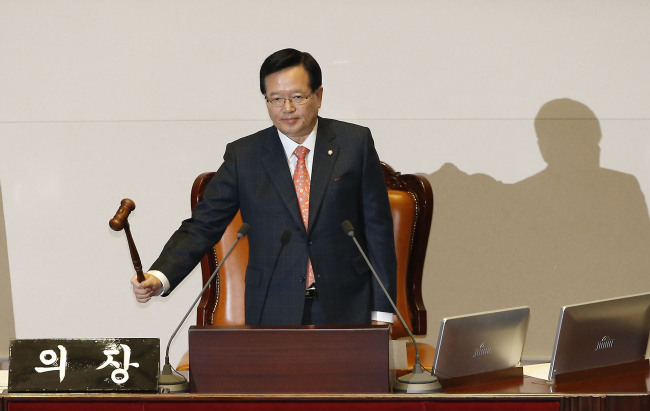The National Assembly on Monday confirmed Lee Wan-koo’s nomination as prime minister, despite attempts by the main opposition party to stall the controversial appointment.
Lee received 148 of the 281 votes in Monday’s plenary session. Legislators in Lee’s governing Saenuri Party are likely to have supported him in the secret ballot. The New Politics Alliance for Democracy likely opposed Lee, who is suspected of multiple ethical lapses in his 40-year political career.
 |
National Assembly Speaker Rep. Chung Ui-hwa opens the plenary session in which Rep. Lee Wan-koo of the ruling Saenuri Party was approved as the new prime minister on Monday. (Yonhap) |
The split vote means Lee’s political clout in his first months as prime minister is likely to be limited. Allegations lodged mainly by the NPAD that Lee evaded conscription, speculated in real estate and collaborated with the juntas of the 1980s will also curb his influence, analyst said.
The vote came after a tense week of partisan deadlock. The plenary vote on Lee’s appointment was originally set for last Thursday. But the NPAD expressed its opposition to Lee, and threatened to boycott the Assembly indefinitely, unless the Saenuri Party agreed to delay the vote. Saenuri floor leader Rep. Yoo Seong-min acceded.
Lee’s nomination late last month had initially received bipartisan support. Lee had earned the opposition’s trust through his role in mediating divisive partisan bills such as the special Sewol bill, as the Saenuri Party’s floor leader last year.
The tables were turned, though, after reports of draft evasion and property speculation arose in Lee’s confirmation hearing last week. Avoiding the military draft is considered especially detrimental to public office seekers here as the nation is still technically at war with North Korea.
NPAD Rep. Jin Sun-mee cited Military Manpower Administration records from the 1970s to assert that Lee had dodged the obligatory draft, possibly through taking advantage of his position as a civil official.
Lee first denied the accusations under oath, saying he had received his first military medical test in Hongseong, South Chuncheong Province. But Jin charged that MMA papers showed Lee had received his medical exam in Seoul, raising concerns that Lee had committed perjury.
Lee suffered another blow during his hearing when the NPAD divulged a voice recording of him apparently trying to intimidate journalists. He can be heard telling reporters that he “knows” higher-ups in the media industry who can get them fired if they write critical reports about him.
Lee apologized, but public dissatisfaction with him appears to have risen due to the disclosure, according to pollsters Gallup Korea and Realmeter.
In a Gallup poll of 1,010 adults nationwide from Feb. 10 to 12, only 29 percent approved Lee’s nomination. It had a margin of error of plus or minus 3.1 percent.
A Realmeter survey of 1,500 adults from Feb. 11 to 13 found that 38.7 percent of respondents were behind Lee, with a margin of error of plus or minus 2.5 percent.
“Putting Lee in the Prime Minister’s Office may benefit us in the short term,” NPAD Rep. Hong Jong-haak said before the Monday vote. “But Rep. Lee is a consistent liar as was shown in last week’s hearing,” he added.
President Park Geun-hye is likely to have picked Lee to serve as the Cabinet’s second-in-command for his skills as a deal-broker, as he could help break through the NPAD’s opposition to draft bills that Park has labeled “critical” for economic growth. These include bills aiming to boost crowdfunding and reforms of the national pension for retired civil servants.
But the partisan strife over Lee’s suspected wrongdoings has cast a shadow over his credibility as the top government deputy, according to critics.
By Jeong Hunny (
hj257@heraldcorp.com)








